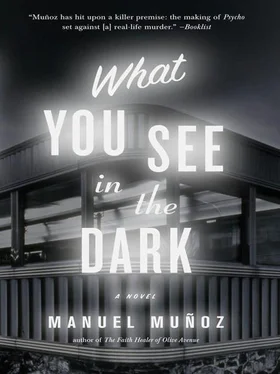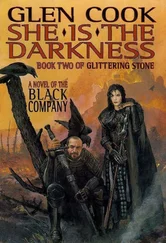In my opinion, the girl should bare her breasts in the opening scene. It would tell the audience everything about how tawdry and put-upon this girl is. But we’re behind the times. Oh, now, I can see by that look on your face that you wouldn’t have done a nude scene. Rest assured that I would never have asked you to do so. But in ten years’ time, I do believe it will be fairly common practice, don’t you agree? Don’t you think the European girls will show us their bare breasts before the Americans?
The feeling in her stomach lightened. The road had only a few curves left, but already she could see that the hills were giving way, as if they were gates of some kind, and the Valley opened up before them, Bakersfield now a straight shot along the flat, dry road.
“Thank you,” the Actress said, and she put her hand on the driver’s shoulder. She could feel his strength through her finger tips. “I appreciate getting here safely.”
Around town, she was known as Mrs. Watson, even though the badge on her pink waitress uniform told everyone at the café that her name was Arlene. She was the woman with the brown hair in a tight bun and a mouth set in a hard straight line. “Mrs. Watson” had always sounded old to her, a school-marm name, even if people used it with respect. A school-marm, though not as old as one. But she had worked there so long that people assumed she was older than she was. She had first started back in 1946—thirteen years ago now — but even then, when she was only thirty-four years old, people called her Mrs. Watson.
They called her that because they knew her husband, Frederick, one of the first proprietors of a business out by Highway 99, a motel built with his own hands, one wing at a time. He had been young when he put up the motel — only in his thirties — and yet people called him Mr. Watson out of respect. They admired his prescience when the roads toward Los Angeles were later improved by the state. More trucks, more produce, more barrels of oil, more chickens, more hogs. All of those drivers needed a place to sleep and they stopped at Watson’s Inn. What a sharp business mind — and for someone so young. All around town he was greeted as Mr. Watson, as sir. Only his close friends called him Frederick.
It was as if he’d been two people, one before and one after, but she knew he was the same person all along, the same Frederick. She, too, was the same Arlene. Her maiden name had been Watson, so when she stood, all those years ago, in Bakers-field’s city hall with a rough bouquet of home-garden zinnias, hardly anything changed. She married Frederick Watson, no relation, his side of the family from Wisconsin and hers from Oklahoma, with no stray cousins in between. She had stood in front of the municipal judge for hardly ten minutes and then stepped away with the same name. Arlene Watson. Except now, as Frederick’s wife, she had no first name.
That morning at the café had been like most, busy very early past dawn, then a second wave around eight thirty, then a short lull before lunch. Because it was October, the high school students who helped on occasion weren’t around to fill out shifts; Arlene and the rest of the waitresses had to hustle to turn over tables. By now, though, they’d all grown used to it, the students having settled back into school around Labor Day. Six weeks of this schedule, or maybe a little more, but things were changing. The light, for one. The harshness of the summer was over and the full plate-glass windows let in the softer hue of the Valley’s autumn sunlight, nothing to squint against, and no more need to draw down the shades. The farmers were relaxing a bit more, the last of the summer harvesting being shipped away, and they lingered around for extra cups of coffee.
“Mrs. Watson …” One of her regulars, a young farmer’s son named Cal, spread the newspaper on the counter and pointed at an article. “Talk’s been going on for a while about this new highway to replace the old Ninety-nine. You worried about that?”
She put down her pot of coffee and leaned her head over, as if to read the article for the very first time, as if she hadn’t scanned it at the crack of dawn in the office of Watson’s Inn, biting her lip.
“Now why would I worry?” Arlene asked.
“That highway goes up, you’d have to rebuild, won’t you? Who would stop at your motel?”
“Those things take years,” she answered, wiping down the counter, busying herself as she had all morning with nervous tidying. Sometimes Cal forgot his manners and wore his hat indoors, as he was doing today. He was young. She reached up and removed the hat for him, as she had been wanting to do all morning long.
He put his hand sheepishly on the hat but made no apology, keeping his finger on the newspaper. She had wanted the gesture to be playful, a suggestion that she was approachable and not just the one among the older waitresses with a hard line for a mouth, but Cal had offered no real reaction, as if she’d never done anything at all. He focused his attention back on the paper. “They say right here, though—”
Vernon, one of the older farmers, hushed him. “Cal, just because she’s pouring coffee doesn’t mean she’s not a smart lady.”
“I don’t mean it like that …”
“All that highway talk is mixed up in a whole mess in federal funding and state regulations up in Sacramento that will take years to sort,” said Vernon. “She’s got time to figure something out.”
“I’m not worried about it right now, Cal,” she said. She poured him some more coffee, though truth was, she wouldn’t mind if he picked up and went off to work for what remained of the morning. She certainly had seen the article; it hadn’t been the first time that mention of the highway had come across the pages.
“Time moves fast,” said Cal, grabbing sugar.
“What do you know about time moving fast?” Vernon said. “What are you, twenty years old or thereabouts?”
“I’m twenty-three.”
When Vernon laughed, he looked over at Arlene as if for approval, and she smiled broadly at him, chagrined a little for Cal despite his meaning well. This is what she liked about Vernon. He was one of the few who seemed to understand that she was someone beyond her last name, someone beyond Frederick’s former wife. She knew how, behind her back, people talked about how Frederick had left her. She knew that. It was that kind of town.
“You need anything else?” she asked Vernon.
“Some pie,” he said. “Slow morning, so I may as well linger. Make it cherry.”
“Cal?”
“No, ma’am,” he answered, not raising his head.
Back in the kitchen, some of the younger waitresses passed the morning lull leaning up against the counters and flipping through copies of Modern Screen, cigarettes held over the sink. Had it been summer, Arlene would’ve clapped her hands to rush them back to work: she wasn’t the manager, but she was the oldest on shift, and they treated her as such, hushing their back-and-forth chitchat whenever she entered the kitchen, blushing if she shook her head disapprovingly at someone’s pleasure in getting playfully grabbed by one of the farmers. When the summer crew was around, she felt a keen sense of their being only girls. She was forty-seven years old and their chatter made her feel every bit of it. She watched them gather around the magazine when one sighed approvingly at a photograph, but paid them no mind as she prepared Vernon’s cherry pie. Vernon might tease Cal for his naïveté, but he wasn’t limited like these girls. He wasn’t like them, incapable of pushing past lazy daydreaming. He was absolutely right about things changing. How someone so young could know such a thing. She wanted to show them how things change before you realize they have. The café’s plate-glass windows, which reached from ceiling to sidewalk, had survived the’52 earthquake, and over the years even the view from them had changed. Across the street, a beautiful flower shop called Holliday’s had opened one spring, complete with an arbor over the front door. Shady, so the flowers and the potted plants could benefit from the open air even as the Valley’s wilting summer heat arrived. The TG&Y expanded, taking over a local five-and-dime, the walls between the stores torn down and the buildings merged, so now you could pull drawers of Simplicity dress patterns and pick your own fabric from a rainbow of bolts lined all in a row. Things change. A wave of tract houses went up over on the east side, every one with a wide lawn. An RCA color TV sat in the window of Stewart’s Appliances for only three weeks, gleaming and expensive, and someone actually had the money to buy it. The farmhouse where she had grown up blew down in a bad storm years and years ago.
Читать дальше












